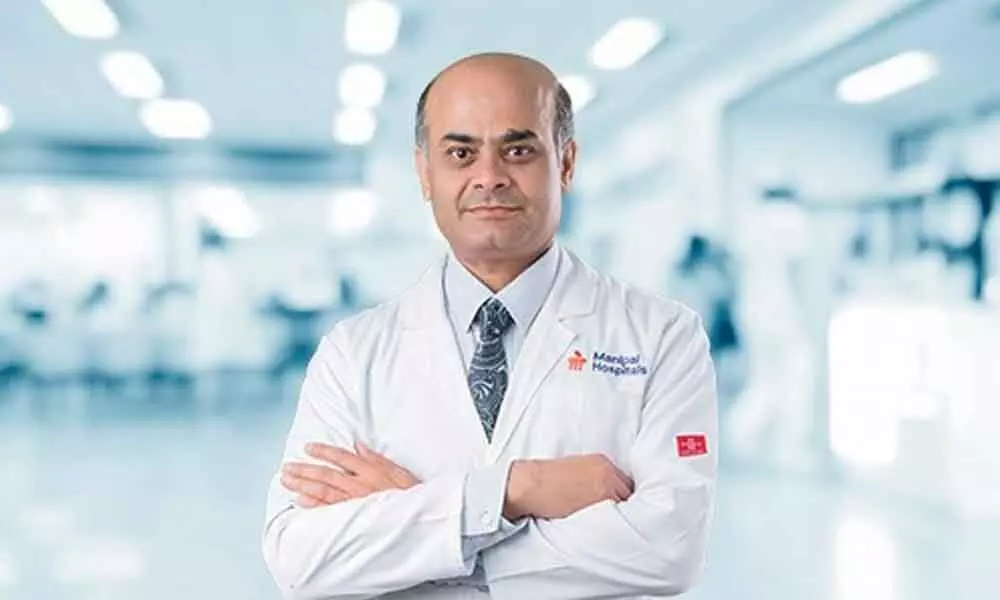Doctors perform rare heart surgery on 2-month-old baby

Doctors perform rare heart surgery on 2-month-old baby
A team of expert cardiac surgeons at Manipal Hospitals, Old Airport Road, performed a very complex surgery successfully on a two-month-old baby.
Bengaluru: A team of expert cardiac surgeons at Manipal Hospitals, Old Airport Road, performed a very complex surgery successfully on a two-month-old baby.
The baby developed breathing difficulties, excessive sweating and feeding issues after 5-6 weeks of birth. When taken for a routine check-up, the paediatrician noticed a heart murmur and referred him for further investigations. On evaluation, an echocardiogram showed that the child had a very rare type of obstruction to the blood flow in both large arteries of the heart called Supravalvular aortic stenosis (SVAS) and Supravalvular pulmonary stenosis (SVPS). It meant that the two major arteries leaving the heart (one taking blood to the body and other taking blood to the lungs) had severe stenosis or narrowing resulting in significant obstruction of blood flow.
Dr Devananda N S, HoD & Consultant - Cardiothoracic Vascular Surgery, Heart and Lung Transplant Surgery, Manipal Hospitals, Old Airport Road, called it an extremely rare condition, especially having significant obstruction in both the great arteries to the extent that it has reduced the function of the heart.
The bigger concern that caught the attention of the expert cardiology team was that the right ventricle of the heart, which pumps blood into the lungs was quite severely dysfunctional. This meant that the child could just not be merely treated with medications for long but there was a need for urgent surgery. After discussion and consent from the child's family, a final decision was made to go ahead with the surgery to remove the obstructions.
The complex procedure took about 4-5 hours and the surgical team handled the difficulties at each level with utmost care and expertise. "We were faced with several challenges while managing the case. Firstly, we had to correct 2 major arteries to allow optimal blood flow. Secondly, anticipated ECMO support in the post-operative care due to the reduced function of the heart. However, our years of experience in managing complex cases coupled with modern infrastructure helped us to save the boy's life." added Dr Devananda N S.
During the procedure, both the arteries were cut open at the place of obstruction and widened by grafting a piece of the pericardium (outer covering of the heart) to allow optimal blood flow through them.
Post-procedure, the child remained stable, improved steadily and gradually. A repeat echocardiogram was done to make sure that the obstruction was released completely without causing damage to the heart valve. The doctors were finally able to get rid of all the medications and discharged the child after 2 weeks with almost near-normal heart functions. The right ventricle which was quite dysfunctional also recovered by 60-70% and is expected to recover completely by another month or two.
Supravalvular aortic stenosis (SVAS) is a birth defect of the heart. There is a narrowing or stenosis of large blood vessels that carry blood from the heart to the body (aorta). SVAS, when left untreated can cause shortness of breath, chest pain due to the poor blood supply and ultimately lead to heart failure. SVAS is found to occur in 1 in 20,000 newborn babies.
The complex procedure took about 4-5 hours and the surgical team handled the difficulties at each level with utmost care and expertise. We were faced with several challenges while managing the case. Firstly, we had to correct 2 major arteries to allow optimal blood flow. Secondly, anticipated ECMO support in the post-operative care due to the reduced function of the heart. However, our years of experience in managing complex cases coupled with modern infrastructure helped us to save the boy's life."
- Dr Devananda N S








